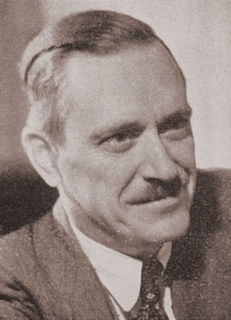A Quote by Erich Fromm
The pace of science forces the pace of technique. Theoretical physics forces atomic energy on us; the successful production of the fission bomb forces upon us the manufacture of the hydrogen bomb. We do not choose our problems, we do not choose our products; we are pushed, we are forced -- by what? By a system which has no purpose and goal transcending it, and which makes man its appendix.
Related Quotes
You bomb ISIL. You're not trying to bomb innocent people. And that requires intelligence and confidence in our military to be able to develop the kinds of targets that we need. We're already doing Special Forces, who are going to help us gather that intelligence and help advise and assist and train local forces so that they can go after ISIL in areas like Raqqah and Mosul.
We must take the abiding spiritual values which inhere in the deep experiences of religion in all ages and give them new expression in terms of the framework which our new knowledge gives us. Science forces religion to deal with new ideas in the theoretical realm and new forces in the practical realm.
I think the Bhagavad Gita is about both the forces of light and the forces of darkness that exist within our own self, within our own soul; that our deepest nature is one of ambiguity. We have evolutionary forces there - forces of creativity, and love, and compassion, and understanding. But we also have darkness inside us - the diabolical forces of separation, fear and delusion. And in most of our lives, there is a battle going on within ourselves.
We must ask whether our machine technology makes us proof against all those destructive forces which plagued Roman society and ultimately wrecked Roman civilization. Our reliance - an almost religious reliance - upon the power of science and technology to forever ensure the progress of our society, might blind us to some very real problems which cannot be solved by science and technology.
For us necessity is not as of old an image without us, with whom we can do warfare; it is a magic web woven through and through us, like that magnetic system of which modern science speaks, penetrating us with a network subtler than our subtlest nerves, yet bearing in it the central forces of the world.
The havoc wrought by war, which one compares with the havoc wrought by nature, is not an unavoidable fate before which man stands helpless. The natural forces that are the cause of war are human passions, which it lies in our power to change. What are culture and civilization if not the taming of blind forces within us as well as in nature?
We do not choose to be born.We do not--most of us, choose to die, or the times or conditions of our death. But within all this realm of choicelessness, we do choose how we shall live--Courageously or in cowardice, Honorably or dishonorably, With purpose or adrift. We decide what is important and what is trivial. What makes us significant is what we DO, Or REFUSE TO DO. WE DECIDE and WE CHOOSE--and so we give definition to our lives.
Yet still, there are those special secret moments in our lives, when we smile unexpectedly-when all our forces are resolved. A woman can often see these moments in us, better than a man, better than we ourselves, even. When we know these moments, when we smile, when we are not on guard at all-these are the moments when our most important forces show themselves; whatever it is you are doing at such a moment, hold on to it, repeat it-for that certain smile is the best knowledge that we ever have of what our hidden forces are, and where they lie, and how they can be loosed.
It is only great pain--that slow, sustained pain that takes its time, in which we are, as it were, burned with smoldering green firewood--that forces us philosophers to sink to our ultimate profundity and to do away with all the trust, everything good-natured, veil-imposing, mild and middling, on which we may have previously based our humanity. I doubt that such a pain makes us 'better'--but I know that it makes us deeper.
The popularity of disaster movies expresses a collective perception of a world threatened by irresistible and unforeseen forces which nevertheless are thwarted at the last moment. Their thinly veiled symbolic meaning might be translated thus: We are innocent of wrongdoing. We are attacked by unforeseeable forces come to harm us. We are, thus, innocent even of negligence. Though those forces are insuperable, chance will come to our aid and we shall emerge victorious.
We are pushed forward by the social forces, reluctant and stumbling, our faces over our shoulders, clutching at every relic of the past as we are forced along; still adoring whatever is behind us. We insist upon worshipping 'the God of our fathers.' Why not the God of our children? Does eternity only stretch one way?






































